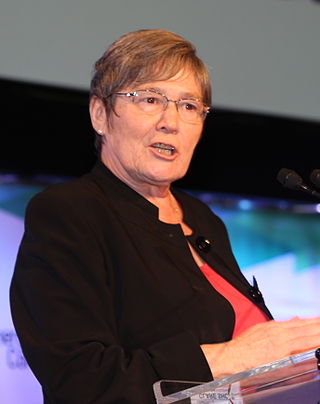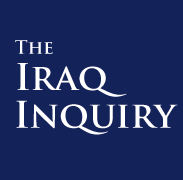
Sir Thomas Dalyell, 11th Baronet,, , known as Tam Dalyell, was a Scottish Labour Party politician who was a member of the House of Commons from 1962 to 2005. He represented West Lothian from 1962 to 1983, then Linlithgow from 1983 to 2005. He formulated what came to be known as the "West Lothian question", on whether non-English MPs should be able to vote upon English-only matters after political devolution. He was also known for his anti-war, anti-imperialist views, opposing the Falklands War, the Gulf War, the War in Afghanistan and the Iraq War.

Clare Short is a British politician who served as Secretary of State for International Development under Prime Minister Tony Blair from 1997 to 2003.

Ann Clwyd Roberts is a Welsh Labour Party politician who served as Member of Parliament (MP) for Cynon Valley for 35 years, from 1984 until 2019. Although she had intended to stand down in 2015, she was re-elected in that year's general election and in 2017 before standing down in 2019.

Robert Graham Marshall-Andrews KC is a British barrister, author, and retired politician, who was the Labour Member of Parliament (MP) for Medway from 1997 to 2010. He defected from his former party at the 2017 general election and endorsed the Liberal Democrats.
Alice Mahon was a British trade unionist and Labour politician who was the Member of Parliament for Halifax from 1987 until 2005.

Elfyn Llwyd PC is a Welsh barrister and politician. He was a Member of Parliament, representing Meirionnydd Nant Conwy in the House of Commons from 1992 to 2010 and Dwyfor Meirionnydd from 2010 to 2015. Llwyd was Plaid Cymru's Westminster parliamentary group leader.

Adam Robert Price is a Welsh politician serving as the Leader of Plaid Cymru since 2018. Since 2016, he has sat in the Senedd for Carmarthen East and Dinefwr, having previously been a Member of Parliament (MP) for the Carmarthen East and Dinefwr constituency.

Sir Richard Geoffrey James Ottaway is a British Conservative Party politician who served as the Member of Parliament for Croydon South from 1992 to 2015. He was previously MP for Nottingham North from 1983 to 1987.

These are the activities that were undertaken by the candidates and their political parties in the lead up to the 2005 general election.
The Downing Street memo, sometimes described by critics of the Iraq War as the smoking gun memo, is the note of a 23 July 2002 secret meeting of senior British government, defence and intelligence figures discussing the build-up to the war, which included direct reference to classified United States policy of the time. The name refers to 10 Downing Street, the residence of the British prime minister.

Sir Anthony Charles Lynton Blair is a British former politician who served as Prime Minister of the United Kingdom from 1997 to 2007 and Leader of the Labour Party from 1994 to 2007. He previously served as Leader of the Opposition from 1994 to 1997, and had served in various shadow cabinet posts from 1987 to 1994. Blair was the Member of Parliament (MP) for Sedgefield from 1983 to 2007. He is the second longest serving prime minister in modern history after Margaret Thatcher, and is the longest serving Labour politician to have held the office.
The Wilson Doctrine is a convention in the United Kingdom that restricts the police and intelligence services from tapping the telephones of members of the House of Commons and House of Lords. It was introduced in 1966 and named after Harold Wilson, the Labour Prime Minister who established the rule. Since it was established, the development of new forms of communication, such as mobile phones and email, has led to extensions of the doctrine. However, it was never extended to cover members of the new devolved legislatures.
British Parliamentary approval for the invasion of Iraq was given by the elected members of the House of Commons to Tony Blair's government on the eve of the 2003 invasion of Iraq, in a series of two votes, on 18 March 2003.

Tony Blair's term as the prime minister of the United Kingdom began on 2 May 1997 when he accepted an invitation of Queen Elizabeth II to form a government, succeeding John Major of the Conservative Party, and ended on 27 June 2007 upon his resignation. While serving as prime minister, Blair also served as the first lord of the treasury, minister for the civil service and leader of the Labour Party.

The 2003 invasion of Iraq by the United States, United Kingdom, Australia, Poland and a coalition of other countries was a violation of the United Nations Charter, the bedrock of international relations in the post-World War II world. The then United Nations Secretary-General Kofi Annan stated in September 2004 that: "I have indicated it was not in conformity with the UN charter. From our point of view and the UN Charter point of view, it [the war] was illegal".

The Iraq Inquiry was a British public inquiry into the nation's role in the Iraq War. The inquiry was announced in 2009 by Prime Minister Gordon Brown and published in 2016 with a public statement by Chilcot.

Impeachment is a process in which the Parliament of the United Kingdom may prosecute and try individuals, normally holders of public office, for high treason or other crimes and misdemeanours. First used to try William Latimer, 4th Baron Latimer during the English Good Parliament of 1376, it was a rare mechanism whereby Parliament was able to arrest and depose ministers of the Crown. The last impeachment was that of Henry Dundas, 1st Viscount Melville in 1806; since then, other forms of democratic scrutiny have been favoured and the process has been considered as an obsolete—but still extant—power of Parliament.

The European Union (Withdrawal) Act 2019, commonly informally referred to as the Benn Act after the Labour MP Hilary Benn as Chair of the Exiting the European Union Select Committee who introduced it, was an act of the Parliament of the United Kingdom that required the Prime Minister of the UK to seek an extension to the Brexit withdrawal date—then scheduled for 31 October 2019—in certain circumstances. The main provisions of the Act were triggered if the House of Commons did not give its consent to either a withdrawal agreement or leaving without a deal by 19 October 2019. The Act proposed a new withdrawal date of 31 January 2020, which the Prime Minister was obliged to accept if the proposal was accepted by the European Council.
On 28 August 2019, the Parliament of the United Kingdom was ordered to be prorogued by Queen Elizabeth II upon the advice of the Conservative prime minister, Boris Johnson, advice later ruled to be unlawful. The prorogation, or suspension, of Parliament was to be effective from between 9 and 12 September 2019 and last until the State Opening of Parliament on 14 October 2019; in the event, Parliament was suspended between 10 September and 24 September. Since Parliament was to be prorogued for five weeks and reconvene just 17 days before the United Kingdom's scheduled departure from the European Union on 31 October 2019, the move was seen by many opposition politicians and political commentators as a controversial and unconstitutional attempt by the prime minister to avoid parliamentary scrutiny of the Government's Brexit plans in those final weeks leading up to Brexit. Johnson and his Government defended the prorogation of Parliament as a routine political process that ordinarily follows the selection of a new prime minister and would allow the Government to refocus on a legislative agenda.

















